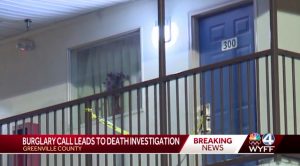
David Edens Jr. Killed in Greenville, SC Motel Shooting. (WYFF4.com)
Did negligent security contribute to this motel shooting death and are justice and compensation available to the victim’s family? Read Our Legal Take below to find out what legal options are available.
LOCAL NEWS
A man was shot and killed at a Greenville, South Carolina motel Tuesday night, November 19, 2019.
As reported by WYFF4.com, “[d]eputies were called about 10:35 p.m. Tuesday to [a]… Motel…on Wade Hampton Boulevard.”
According to the report, “[w]hen deputies arrived, they found a man, later identified as 22-year-old David Edens Jr., dead inside one of the rooms.”
A suspect has been arrested in connection to the homicide.
FoxCarolina.com is reporting, “[the suspect] busted out the window of at least one other motel room while searching for [Mr.] Edens.”
According to the report, “[o]nce [the suspect] found him…a altercation occurred and [the suspect] shot [Mr.] Edens, resulting in his death.”
The investigation is ongoing.
OUR LEGAL TAKE
Motel guests and visitors have a right to feel safe and secure while on the premises. The level of security provided at the motel is of significance, and is a relevant consideration when analyzing whether this shooting may have been prevented. The following questions are also important in assessing whether this incident may have been avoided:
- Have there been prior incidents of violence on or near the property?
- Was the motel aware of any improper activity before the incident occurred?
- What security measures, such as guarded-entry, monitored surveillance cameras, bright lighting, and visible security patrols were in place to deter crime and protect the victim and others at the time of the shooting?
Property owners are generally required to protect against foreseeable harm to anyone and everyone legally on the premises. Should the investigation into this incident reveal facts that establish that the motel owner or management lacked adequate security to protect its guests and visitors, the family of David Edens Jr. may seek justice and elect to pursue legal claims and substantial compensation for their loss.
The Murray Law Firm has extensive and successful experience in handling security negligence claims on behalf of victims and their families, and suggests that an immediate, unbiased inspection of the property will need to be performed so as to limit evidence from being altered, damaged or destroyed. The complexities of pursuing a negligent security case are well understood by the legal team at The Murray Law Firm, and it is imperative that the family of David Edens Jr retain a capable law firm who will work without delay to protect his interests.
OUR RESULTS: OVER $100 MILLION IN VERDICTS AND SETTLEMENTS FOR OUR CLIENTS
The Murray Law Firm has a long history of representing victims of violence and security negligence. We have obtained over $100 Million in verdicts and settlements for our Clients, including a $29.25 million dollar verdict for a victim of an unsafe property. We offer our legal assistance, if desired.
We represent our Clients on a contingency agreement, which generally means that no fees or payments are owed until and unless we recover. Anyone seeking further information or legal representation is encouraged to contact us via e-mail (click here) or by telephone at 888.842.1616. Consultations are free and confidential.
Choosing the Right Attorney (Click Here)
 The Legal Herald
The Legal Herald


